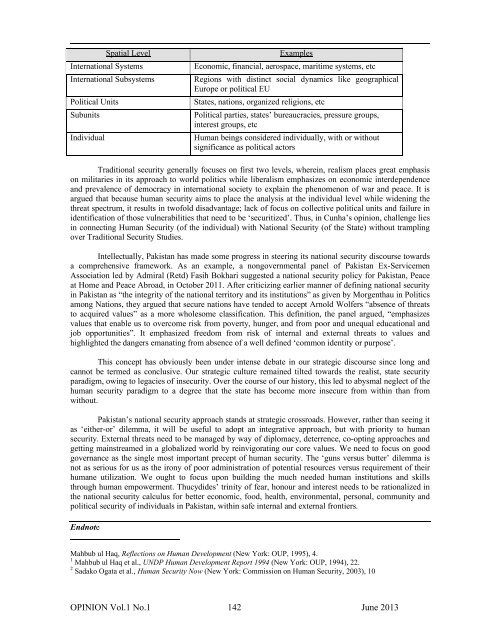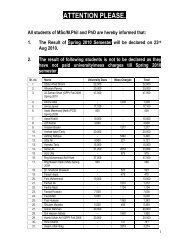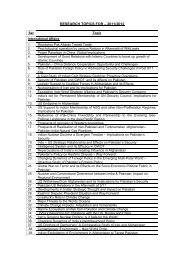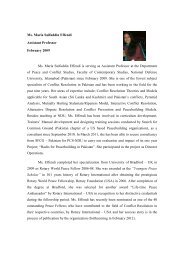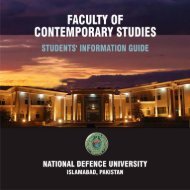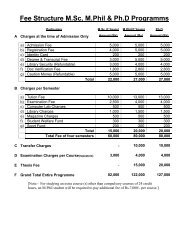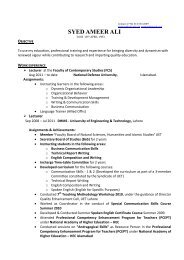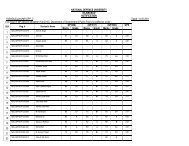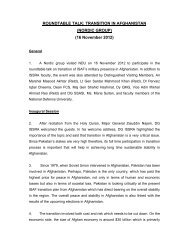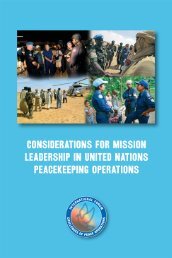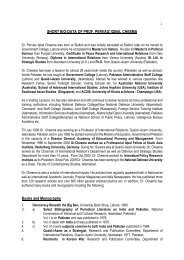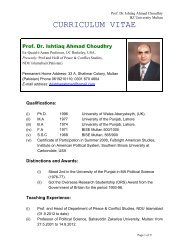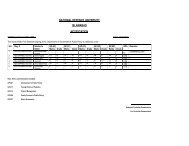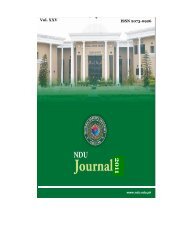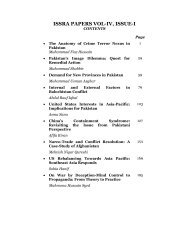OPINION Vol.1, No.1 June 2013 - National Defence University
OPINION Vol.1, No.1 June 2013 - National Defence University
OPINION Vol.1, No.1 June 2013 - National Defence University
You also want an ePaper? Increase the reach of your titles
YUMPU automatically turns print PDFs into web optimized ePapers that Google loves.
Spatial Level<br />
International Systems<br />
International Subsystems<br />
Political Units<br />
Subunits<br />
Individual<br />
Examples<br />
Economic, financial, aerospace, maritime systems, etc<br />
Regions with distinct social dynamics like geographical<br />
Europe or political EU<br />
States, nations, organized religions, etc<br />
Political parties, states’ bureaucracies, pressure groups,<br />
interest groups, etc<br />
Human beings considered individually, with or without<br />
significance as political actors<br />
Traditional security generally focuses on first two levels, wherein, realism places great emphasis<br />
on militaries in its approach to world politics while liberalism emphasizes on economic interdependence<br />
and prevalence of democracy in international society to explain the phenomenon of war and peace. It is<br />
argued that because human security aims to place the analysis at the individual level while widening the<br />
threat spectrum, it results in twofold disadvantage; lack of focus on collective political units and failure in<br />
identification of those vulnerabilities that need to be ‘securitized’. Thus, in Cunha’s opinion, challenge lies<br />
in connecting Human Security (of the individual) with <strong>National</strong> Security (of the State) without trampling<br />
over Traditional Security Studies.<br />
Intellectually, Pakistan has made some progress in steering its national security discourse towards<br />
a comprehensive framework. As an example, a nongovernmental panel of Pakistan Ex-Servicemen<br />
Association led by Admiral (Retd) Fasih Bokhari suggested a national security policy for Pakistan, Peace<br />
at Home and Peace Abroad, in October 2011. After criticizing earlier manner of defining national security<br />
in Pakistan as “the integrity of the national territory and its institutions” as given by Morgenthau in Politics<br />
among Nations, they argued that secure nations have tended to accept Arnold Wolfers “absence of threats<br />
to acquired values” as a more wholesome classification. This definition, the panel argued, “emphasizes<br />
values that enable us to overcome risk from poverty, hunger, and from poor and unequal educational and<br />
job opportunities”. It emphasized freedom from risk of internal and external threats to values and<br />
highlighted the dangers emanating from absence of a well defined ‘common identity or purpose’.<br />
This concept has obviously been under intense debate in our strategic discourse since long and<br />
cannot be termed as conclusive. Our strategic culture remained tilted towards the realist, state security<br />
paradigm, owing to legacies of insecurity. Over the course of our history, this led to abysmal neglect of the<br />
human security paradigm to a degree that the state has become more insecure from within than from<br />
without.<br />
Pakistan’s national security approach stands at strategic crossroads. However, rather than seeing it<br />
as ‘either-or’ dilemma, it will be useful to adopt an integrative approach, but with priority to human<br />
security. External threats need to be managed by way of diplomacy, deterrence, co-opting approaches and<br />
getting mainstreamed in a globalized world by reinvigorating our core values. We need to focus on good<br />
governance as the single most important precept of human security. The ‘guns versus butter’ dilemma is<br />
not as serious for us as the irony of poor administration of potential resources versus requirement of their<br />
humane utilization. We ought to focus upon building the much needed human institutions and skills<br />
through human empowerment. Thucydides’ trinity of fear, honour and interest needs to be rationalized in<br />
the national security calculus for better economic, food, health, environmental, personal, community and<br />
political security of individuals in Pakistan, within safe internal and external frontiers.<br />
Endnote<br />
Mahbub ul Haq, Reflections on Human Development (New York: OUP, 1995), 4.<br />
1 Mahbub ul Haq et al., UNDP Human Development Report 1994 (New York: OUP, 1994), 22.<br />
2 Sadako Ogata et al., Human Security Now (New York: Commission on Human Security, 2003), 10<br />
<strong>OPINION</strong> <strong>Vol.1</strong> <strong>No.1</strong> 142 <strong>June</strong> <strong>2013</strong>


